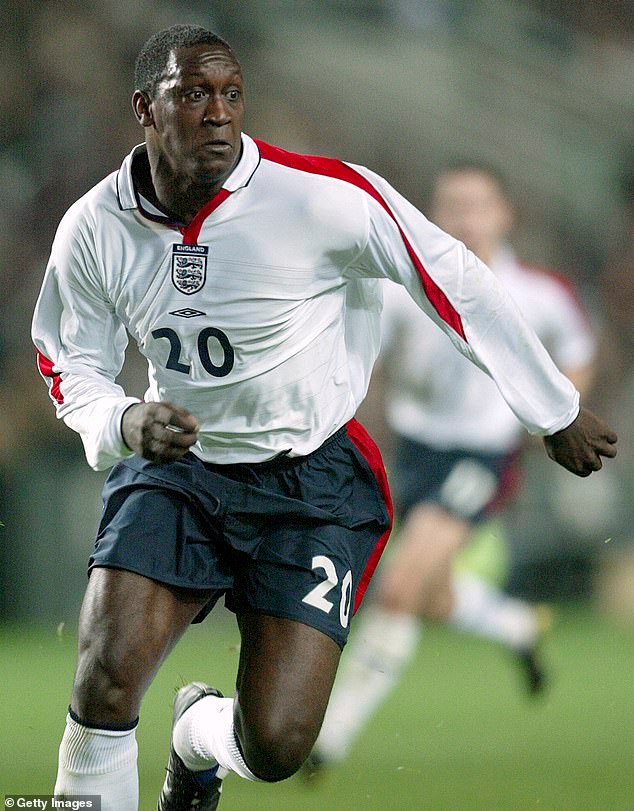The country holds its breath in hope today as the Three Lions play Spain in the Euro 2024 final.
While the England squad have not yet missed a penalty this tournament, many of the team are likely to be scoring an own goal at home. At least where their money is concerned.
Despite Premier League players earning an average of £70,000 a week, footballers are notoriously bad at managing their finances. Sports charity Xpro claims 40 per cent of footballers go bankrupt within five years of retirement.
Former England internationals Emile Heskey and Wes Brown have reportedly been served bankruptcy orders recently. In 2009 Heskey was worth an estimated £12million. And former stars David James and Paul Gascoigne have also struggled to keep their heads above water financially.
So what lessons can we learn from their mistakes? We ask financial advisers.

Former England international Emile Heskey was worth an estimated £12million in 2009 but has reportedly been served a bankruptcy order recently

Former footballing star David James has struggled to keep his head above the water financially
Unrestricted spending and a lack of a savings plan is their number one money vice. Chris Reed, from Stonehill Financial, who looks after the finances of eight Premier League stars, says: ‘Most footballers come from fairly simple backgrounds, with working parents.
‘They are often scouted at a young age so to go from living a normal life to earning five figures a week. That’s a lot of money for any of us but for someone in their teens with no financial experience, it’s a lot to take on.’
Footballers are known for extravagant lifestyles, but their spending can rapidly get out of hand. With their short-lived careers, reckless spending could mean they find themselves out of money by age 35 unless they set aside savings.
Reed says: ‘It’s tricky because they are getting tens of thousands every month so if they blow it all, they know next month the money will go back in.
‘It’s only natural they want all the stuff they’ve seen on social media: the boat parties, the big holidays and the fancy cars.’
He advises his clients to set aside 10 per cent of their gross earnings into savings, investments and pension. ‘The cumulative effect of saving 10-12 per cent of your earnings builds steadily and should leave them with enough,’ he says.
If the average Premier League player stuck to this formula from age 19, they would have £7-8 million by age 35, assuming annual returns of 4-5 per cent, the adviser says.

Former England player Paul Gascoigne has also struggled with his finances
‘This pot of money will either sustain them, can be used to retrain or to set up a business.’
While you may not be able to retire at 35, this savings rule of thumb can apply to everyone, Reed adds. Putting aside 10 per cent of your pre-tax income can help you achieve your personal financial goals. Adam Osper, of Evelyn Partners, who also works with football players, says he even recommends saving 50 per cent of net income.
The next mistake is in their retirement planning. Most of us are failing to set aside enough for our later years – but we have more than 40 years to plan for it.
Many footballers are guilty of trying to pile cash into their savings when it’s too late, in the last five years of their careers, Reed says.
This is much like when 60-year-olds realise they must pump up their pensions. ‘It’s too late by then,’ he says. ‘You will not benefit from the cumulative effect of investing that money over time thanks to compound returns. You will also be restricted by allowances.’
You can pay up to £60,000 into a pension each year, or £10,000 for those earning more than £260,000 a year. Similarly, you can put up to £20,000 a year into Isas, which are a tax-efficient way of investing in stocks and shares.
Footballers are also prone to getting drawn into flashy but high-risk investments. These often end in disaster, with investors losing much of the capital they put towards the project.
Reed says: ‘They should not be throwing money at sexy, exotic investments that are high risk, high return. Instead, we go for mainstream investments that will return 4-5 per cent a year.’
The financial adviser favours Vanguard’s range of market tracking funds, that are cheap and offer a lot of diversity.
‘Boring is good when it comes to investing,’ he says. Osper echoes this: ‘We set up simple investment portfolios and don’t do anything too complicated.’
Footballers are just as prone to falling into the fads peddled by financial influencers on social media, such as cryptocurrency. But these can prove disastrous decisions if done wrong.
Reed says: ‘If you want to take risks then it has to come out of your spending budget not your savings. You wouldn’t take the money that you have earmarked for your pension and put it on a dog at the races. We aren’t trying to make a quick buck, it’s about long-term growth.’





